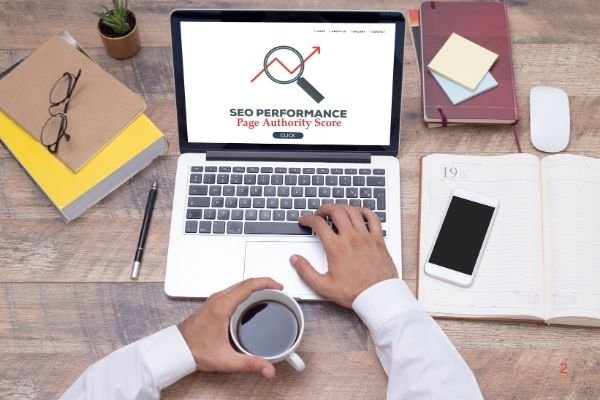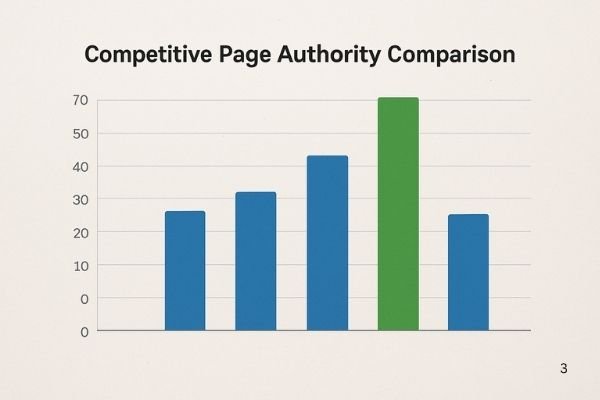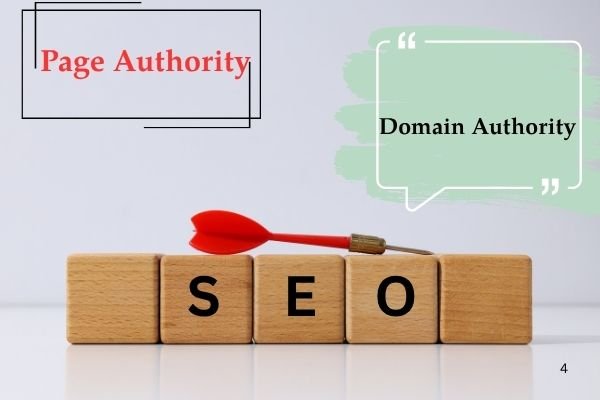How Page Authority Can Affect Your Google Rankings
Page Authority (PA) is a predictive ranking metric developed by Moz that scores webpages from 1-100 based on their likelihood to rank in search results. Higher Page Authority scores indicate stronger ranking potential, making this metric essential for SEO strategy and competitive analysis. Unlike Domain Authority which measures entire websites, Page Authority focuses specifically on individual page performance using machine learning algorithms that analyze over 40 ranking factors including link quality, domain strength, and content signals.

Understanding Page Authority Made Simple
Page Authority (PA) represents a ranking score created by Moz. This metric forecasts how effectively a webpage will perform in search results. Page Authority uses a scale from 1 to 100 points. Higher numbers indicate stronger ranking potential for your content.
Page Authority calculations rely on comprehensive web index data. The system analyzes dozens of ranking factors simultaneously. Similar to Domain Authority® (DA), it employs machine learning technology. This advanced system identifies which algorithms match real search rankings best. The technology examines thousands of search result pages for accuracy. Then it generates precise Page Authority scores using proven calculations.
How to Check Page Authority Scores Without Paying
You can discover the PA score for any webpage completely free. Visit Moz Link Explorer and type in your target page’s web address. For this demonstration, we’re checking the men’s clothing section on Patagonia.com. Press the search button located beside the input field. You might need to create a free Moz community account first. After logging in, you’ll instantly access valuable ranking data. Link Explorer provides this information for any URL you submit.
How Page Authority Scoring Actually Works
Moz calculates Page Authority using a 100-point logarithmic system. This means growing from 20 to 30 points is much easier than jumping from 70 to 80. The algorithm receives constant updates, so expect occasional score changes over time.
PA examines dozens of ranking signals, including these key factors: linking URLs, linking root domains, linking subdomains, MozTrust plus MozRank scores, followed links, nofollowed links, link anchor text patterns, 301 and 302 redirect status, new versus old link age, top level domains, domain names, branded mentions, Spam Score ratings, and many additional elements.
Building stronger link profiles remains essential for boosting page authority. This strategy directly improves other crucial metrics like keyword rankings and organic traffic growth. This comprehensive list clearly shows that PA focuses heavily on link-related factors.
Why Page Authority Matters for Your Success
Page Authority delivers valuable insights for spotting growth opportunities and analyzing competitor strategies. This metric helps measure progress over time and compare different pages effectively. Like other SEO tools, Page Authority creates multiple benefits for your marketing efforts. You can establish performance baselines, take strategic actions, then measure your results accurately.
High page authority scores provide marketers with reliable visibility predictions for search results. These scores directly connect to increased website traffic and stronger brand reputation. Repeating this measurement process helps demonstrate your work’s value to organizations and clients. This data-driven approach creates focused strategies that prioritize actions producing significant improvements.
The Technical Side of Page Authority Explained
Page Authority uses the same calculation method as Domain Authority but focuses on individual pages. The system draws data from Moz’s comprehensive Link Explorer web index. This calculation includes link counts plus over 40 additional ranking factors combined.
Remember that PA ignores specific on-page optimization elements like keyword usage or content quality. Page Authority relies on machine learning algorithms similar to Domain Authority and Brand Authority systems. These scores change as new data enters the algorithm continuously.
Use Page Authority as a comparison tool between different pages rather than absolute rankings. This relative approach provides more accurate insights than treating PA as a definitive score.

Understanding What Makes a Good Page Authority Score
This common question deserves a detailed answer for effective SEO strategy. Page Authority works best as a comparison tool rather than an absolute scoring system. Use it for research in search results and identifying pages with stronger link profiles. Since PA functions as a comparative metric, no universal “good” or “bad” scores exist.
Typical good page authority scores range from 30 to 70 points based on industry competition levels. These scores help determine a page’s ranking potential in search engines effectively. You can find more practical answers to this question by examining three main scenarios where PA research proves most valuable.
Top Ways to Use Page Authority Effectively
Many situations require checking specific page authority scores, but these three scenarios happen most frequently:
Using PA for Competitive Research
You’ll regularly check competitor page authority scores to predict your performance against them. Your main goal involves learning how high your PA must reach to match and exceed competitor metrics through effective Google consulting.
Remember that actual numbers vary completely based on your unique competitive landscape. Instead of targeting specific PA numbers like your page operates alone, compare against direct competitors first. This approach gives you realistic benchmarks for your own pages. The competing page might score 10, 50, or 70 points depending on your market.
Using PA for Link Research
Numbers will vary again, but PA helps determine which pages offer more valuable link opportunities. Imagine your organization sponsored an event with two linking options available. The host offers links from a page with PA 49 or another with PA 91. You’d choose the higher-scoring page in most situations.
PA also helps prioritize link building outreach across multiple websites effectively. Site A might only have pages scoring below PA 15. Site B offers multiple pages above PA 50. You’d naturally prioritize earning links from Site B first.
PA assists with internal linking strategy decisions too. Your organization launches a new guide requiring internal links from existing content. Checking your own pages’ PA scores helps identify which pages transfer the most authority to newly-published content.
Using PA for Reporting and Tracking
SEO professionals, marketers, and in-house employees can use PA in reporting to help decision-makers understand effort results. When building inbound links or improving internal linking strategies, Moz Link Explorer and other Moz Pro tools track PA changes effectively. These tools demonstrate how your work produces gradual, month-over-month increases in this important metric.
PA tracking also helps pinpoint score drops for troubleshooting purposes, especially when losing links from specific sources. Remember that number fluctuations are normal due to machine learning algorithm updates. However, tracking PA over extended periods helps demonstrate consistent growth patterns to stakeholders and clients.
Is Page Authority Actually a Google Ranking Factor?
No, PA is not a confirmed Google search engine ranking factor. SEOs regularly speculate about factors influencing search positioning, but only Google knows all algorithm components. As stated earlier, PA represents a Moz-created metric, not a Google-acknowledged or created ranking factor.
SEO software users should exercise caution with products claiming definitive ranking factor identification or guaranteed results. Legitimate SEO practices observe patterns of factors appearing to positively or negatively influence search visibility. Only Google controls its algorithms and search result pages completely.
Many link-based factors forming Page Authority’s foundation have long been considered top search ranking influences. Google representatives regularly discuss how links impact rankings, acknowledging that link aspects affect search visibility. Therefore, metrics like PA measure factors that Google has confirmed exist within their algorithms.

Page Authority vs. Domain Authority: Key Differences
Page Authority measures predictive ranking strength for individual pages only. Domain Authority measures strength across entire domains or subdomains instead. Both metrics use identical calculation methods, making them more similar than different in practice.
Where to Find Page Authority Scores
Within the Moz ecosystem, check Page Authority using Link Explorer, MozBar, or Moz’s free SEO toolbar easily. You can also access PA through the SERP Analysis section of Keyword Explorer. Authority metrics integrate into all Moz Pro campaigns automatically.
Moz’s Page Authority appears in dozens of SEO and online marketing platforms across the web. These integrations bring SEO insights into comprehensive digital marketing dashboards effectively. If you’re building custom dashboards, start using Moz’s API for access. The API includes various endpoints covering backlink metrics, keywords, and additional data points.
How to Increase Your Page Authority Score
Page Authority represents a comprehensive score that’s difficult to influence directly. Multiple metrics combine to create this aggregate score together. This multi-factor approach is intentional since Google considers many ranking factors simultaneously. Any metric calculating search potential must incorporate numerous factors as well.
The most effective way to boost page authority involves improving your link profile strategically. Accomplish this by securing external links from other high-authority pages effectively. These links function as “votes of confidence” for your page’s credibility and authority.
Use the Linking Domains section in Moz Link Explorer to discover which domains currently link to your pages. Apply this same tool to analyze competitor pages and identify their most authoritative linking sources. This research helps create strategic plans for earning stronger links over time.
Content Optimization for Better Page Authority
Content optimization plays a crucial role in improving Page Authority scores effectively. This process involves creating high-quality, engaging, and informative content that connects with your target audience. Here are proven tips for optimizing your content successfully:
Conduct comprehensive keyword research to identify relevant and high-traffic keywords your audience actively searches for. Use these keywords strategically throughout your content to boost visibility in search engine results. Structure your content using header tags like H1, H2, and H3 to highlight important keywords. This makes navigation easier for both users and search engines.
Optimize your meta title and description to accurately reflect your page content. These elements should entice users to click through from search engine results pages. Use descriptive and keyword-rich alt tags for all images to improve image search visibility. Focus on providing genuine value to your target audience through well-researched and well-written content consistently.
Implement internal linking strategies to help users and search engines navigate your website design effectively. Link to related content within your site to distribute authority and improve user experience. By optimizing your content using these techniques, you can improve Page Authority and increase ranking potential significantly.
Link Building for Higher Page Authority
Link building represents another critical factor in improving Page Authority scores effectively. This process involves acquiring high-quality backlinks from authoritative websites to increase your page’s authority and ranking potential.
Focus on acquiring links from authoritative websites with high Domain Authority and Page Authority scores. These connections boost your page’s credibility and search engine trust signals. Consider leveraging Google Ads campaigns to drive initial traffic while building organic authority through guest blogging and content marketing strategies.
Participate actively in online communities and forums related to your industry or topic area. Engage genuinely with these communities to build meaningful relationships and acquire natural links over time. Create valuable resources and linkable assets that other websites naturally want to reference and link to.
Avoid buying links or participating in manipulative link schemes at all costs. These dangerous practices can harm your Page Authority significantly and lead to severe penalties from search engines. By building high-quality backlinks through legitimate link building methods, you can improve Page Authority and increase ranking potential substantially.
Factors That Influence Page Authority Scores
Page Authority scores are influenced by multiple important factors working together. Domain Authority of the hosting domain plays a significant role in determining individual Page Authority scores. Pages on stronger domains typically receive higher authority scores from the start.
Inbound links represent crucial ranking factors for Page Authority calculations. The number and quality of links pointing to your page matter tremendously. High-quality backlinks from authoritative sites can boost your Page Authority scores significantly.
Content quality affects authority scores through relevance, usefulness, and user engagement levels. High-quality content that satisfies user intent consistently improves authority scores over time. Page structure also impacts scores through proper organization and strategic use of header tags and internal links.
User experience factors like page loading speed, mobile responsiveness, and overall usability influence authority calculations. Positive user experiences enhance Page Authority scores while poor experiences hurt rankings. Social signals from media presence and engagement can indicate content popularity and relevance.
Spam factors present serious threats to Page Authority scores when low-quality or spammy content appears. Maintain high content standards and avoid manipulative practices to protect your authority scores. Understanding these factors helps optimize pages for improved Page Authority and increased ranking potential.
Measuring and Tracking Page Authority Effectively
Measuring and tracking Page Authority is crucial for understanding your page’s performance and identifying improvement opportunities. Several tools and metrics help you measure and track Page Authority progress successfully.
Moz’s MozBar and Link Explorer provide direct access to Page Authority scores ranging from 1 to 100. These tools indicate your page’s current authority level and track changes over extended periods. Use these platforms consistently to monitor Page Authority fluctuations and progress trends.
Google Analytics provides valuable data on page views, bounce rates, and average session duration metrics. Use this behavioral data to understand user interactions and identify specific areas needing improvement. Google Search Console offers crucial data on search engine rankings, impressions, and click-through rates.
This powerful tool helps track your page’s actual performance in search engine results pages. By monitoring these combined metrics regularly, you gain comprehensive insights into page performance patterns. This data-driven approach helps identify specific improvement areas that can increase Page Authority scores effectively.

Best Practices for Reporting on Page Authority
When reporting on Page Authority, providing context and actionable insights helps stakeholders understand the data effectively. These proven best practices create informative reports that drive better decision-making.
Provide clear explanations of Page Authority and its importance for SEO success. Ensure stakeholders understand what Page Authority measures and why it matters for ranking potential. Include graphs or charts to visualize your page’s Page Authority scores over time periods. Visual representations make trends and score changes much easier to understand quickly.
Highlight significant changes in Page Authority and provide insights into what caused these fluctuations. Explain any major score movements and identify factors that contributed to these changes. Compare your page’s Page Authority scores to industry benchmarks or direct competitors consistently. This context helps stakeholders understand relative performance and competitive positioning.
Provide specific recommendations for improving Page Authority based on your data analysis. Offer actionable insights and proven strategies for increasing scores over time. Use clear and concise language throughout your reports to explain data and insights effectively. Ensure your reporting remains jargon-free and accessible to all stakeholders.
Following these best practices creates informative and actionable reports that demonstrate Page Authority’s importance. This approach helps stakeholders make data-driven decisions that improve Page Authority scores systematically. For professional SEO reporting and consultation, consider working with an experienced Denver SEO agency that understands these nuanced metrics.
Why Your Page Authority Score Changes
Page Authority depends on numerous factors and can fluctuate for various reasons regularly. Understanding these changes helps you interpret score movements and respond appropriately to protect your rankings.
Algorithm updates represent one major cause of Page Authority fluctuations over time. Moz continuously refines their machine learning models to better predict search rankings. These improvements can cause your scores to shift even without changes to your content or links.
Link profile changes directly impact Page Authority scores in both directions. Gaining high-quality backlinks from authoritative sources typically increases your scores. Losing valuable links due to site changes or broken connections can decrease scores significantly.
Competitor activity affects your relative Page Authority positioning within your industry. When competitors build stronger link profiles or improve their content, your relative score might decrease. This doesn’t necessarily mean your page performance declined in absolute terms.
Index updates and data refreshes can cause temporary score fluctuations across the entire system. Moz regularly updates their web index with new data discoveries and link relationships. These updates can reveal previously unknown links or remove outdated connection data.
Understanding these common causes helps you interpret Page Authority changes more accurately. Focus on long-term trends rather than daily fluctuations for better strategic decision-making. Whether you’re managing SEO for a Las Vegas business or a New Brunswick company, these principles apply universally. If you need expert guidance on interpreting these metrics and developing improvement strategies, contact our team for personalized SEO consultation.
Conclusion
Page Authority serves as a valuable compass for SEO strategy, guiding your content optimization and link building efforts toward measurable success. While PA isn’t a direct Google ranking factor, it measures critical elements that search engines do consider when determining page rankings. Focus on building high-quality content, securing authoritative backlinks, and maintaining excellent user experiences to naturally improve your Page Authority scores. Remember that PA works best as a comparative tool against competitors rather than an absolute measurement. Track your progress consistently, analyze fluctuations thoughtfully, and use these insights to refine your SEO approach. Success comes from understanding that Page Authority reflects the culmination of multiple ranking factors working together. Implement these strategies systematically, monitor results regularly, and watch your pages climb higher in search rankings over time.
Frequently Asked Questions
What is considered a good Page Authority score for my website?
Page Authority scores between 30-50 represent solid performance for most websites. Scores above 50 indicate strong authority, while anything over 70 suggests exceptional strength. Focus on outperforming direct competitors rather than hitting specific numbers. Industry competition levels significantly impact what constitutes a “good” score for your niche.
How long does it take to improve Page Authority scores?
Page Authority improvements typically require 3-6 months of consistent SEO efforts to show results. Building high-quality backlinks and creating valuable content takes time to influence algorithms. Moz updates their index regularly, but significant changes appear gradually. Patience with white-hat SEO strategies delivers sustainable Page Authority growth.
Can I increase Page Authority without building external links?
External links remain the primary factor influencing Page Authority scores. However, optimizing internal linking, improving content quality, and enhancing user experience contribute positively. Technical SEO improvements like faster loading speeds help indirectly. While internal optimizations matter, securing quality external backlinks accelerates growth most effectively.
Why did my Page Authority score suddenly drop?
Page Authority drops commonly result from algorithm updates, lost backlinks, or competitor activity. Moz regularly refines their scoring models, causing temporary fluctuations. Check your backlink profile for recently lost authoritative links first. Competitor improvements can lower your relative score without affecting absolute performance.
Does Page Authority directly impact my Google search rankings?
Page Authority doesn’t directly influence Google rankings since it’s a third-party Moz metric. However, PA measures factors that Google considers, including link quality and authority signals. Pages with higher PA scores often rank better because they possess stronger fundamentals. Use Page Authority as a ranking potential indicator.

Mike has over 5 years of experience helping clients improve their business visibility on Google. He combines his love for teaching with his entrepreneurial spirit to develop innovative marketing strategies. Inspired by the big AI wave of 2023, Mike now focuses on staying updated with the latest AI tools and techniques. He is committed to using these advancements to deliver great results for his clients, keeping them ahead in the competitive online market.
